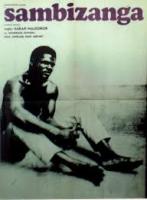 How MPLA’s ideology, in particular its Marxist-Leninist values, shaped Sambizanga? In which ways the film was shaped, by both Maldoror and the MPLA, as a piece of propaganda, in order to gain international recognition for the injustice of the Portuguese rule in Angola and credibility for the MPLA in the international community. Maldoror has said that she tried to accomplish three things with Sambizanga: capture a particular movement in the history of the Angolan liberation struggle; create a film that would educate Westerners to the situation in Angola; and tell the story of a revolution from the perspective of a woman. This dissertation will argue that these three aims can be linked to the propagandistic elements of the film and the ideology of the MPLA.
How MPLA’s ideology, in particular its Marxist-Leninist values, shaped Sambizanga? In which ways the film was shaped, by both Maldoror and the MPLA, as a piece of propaganda, in order to gain international recognition for the injustice of the Portuguese rule in Angola and credibility for the MPLA in the international community. Maldoror has said that she tried to accomplish three things with Sambizanga: capture a particular movement in the history of the Angolan liberation struggle; create a film that would educate Westerners to the situation in Angola; and tell the story of a revolution from the perspective of a woman. This dissertation will argue that these three aims can be linked to the propagandistic elements of the film and the ideology of the MPLA.
Afroscreen
04.06.2014 | by Alice Breitmeyer
 The Olympic Winter Games in Sochi, Russia started on February 7 with the Opening Ceremony, where 88 athletes bearing the flags of their respective nations led their national delegations into the Olympic Stadium. When a lonely man representing Zimbabwe entered on position 26, one could have asked two questions: Why is a Zimbabwean the 26th, if there is an alphabetical order? And, probably more interesting, what is a man from the southern Africa doing at Olympic Winter Games?
The Olympic Winter Games in Sochi, Russia started on February 7 with the Opening Ceremony, where 88 athletes bearing the flags of their respective nations led their national delegations into the Olympic Stadium. When a lonely man representing Zimbabwe entered on position 26, one could have asked two questions: Why is a Zimbabwean the 26th, if there is an alphabetical order? And, probably more interesting, what is a man from the southern Africa doing at Olympic Winter Games?
I'll visit
26.02.2014 | by Robin Nuss
 “Submundo Luso vs 12transfusons” is a new mix tape that features rappers from Angola, Mozambique, Brazil and Portugal. Released on New Year’s Eve after five months of preparation, the project brought together hip-hop promoters from the blogs Submundo Luso [pt] in Mozambique and 12transfusons [pt] in Angola. The two met online and the former invited the latter to collaborate.
In this interview for the blog Underground Lusófono [pt], Astérix o Néfilim (Astérix the Giant, in English), a rapper, producer and manager at 12transfusons, talks about the effort, which counted the participation of artists from all over the globe and is now available as a free download. He also shares his views on the artistic scene in Cabinda – a tiny province in the north of Angola – and the challenges caused by such isolation.
“Submundo Luso vs 12transfusons” is a new mix tape that features rappers from Angola, Mozambique, Brazil and Portugal. Released on New Year’s Eve after five months of preparation, the project brought together hip-hop promoters from the blogs Submundo Luso [pt] in Mozambique and 12transfusons [pt] in Angola. The two met online and the former invited the latter to collaborate.
In this interview for the blog Underground Lusófono [pt], Astérix o Néfilim (Astérix the Giant, in English), a rapper, producer and manager at 12transfusons, talks about the effort, which counted the participation of artists from all over the globe and is now available as a free download. He also shares his views on the artistic scene in Cabinda – a tiny province in the north of Angola – and the challenges caused by such isolation.
Stages
28.01.2014 | by vários
 "I don't consider Brazil that different from Angola, culturally speaking. By the way, Angola currently consumes a lot of global culture. Mostly younger people. Not even the differences in language are an obstacle to the understanding of my comics."
"I don't consider Brazil that different from Angola, culturally speaking. By the way, Angola currently consumes a lot of global culture. Mostly younger people. Not even the differences in language are an obstacle to the understanding of my comics."
Face to face
19.12.2013 | by Luís Henrique and Global Voices (Vozes Globais)
 In contemporary Portuguese cinema, the question is to know how to represent the revolution. How can the revolution’s temporality be reconfigured in the present? How can it be made present and not past? How can the archives of the revolution’s political strength be restored? If the crossing of history is always a critical operation and if the historical approach implies a process of identification with past events, for contemporary Portuguese filmmakers — especially the children of the revolution — these vast archives and this impressive cinematic corpus place the question outside of the reach of any historicism.
In contemporary Portuguese cinema, the question is to know how to represent the revolution. How can the revolution’s temporality be reconfigured in the present? How can it be made present and not past? How can the archives of the revolution’s political strength be restored? If the crossing of history is always a critical operation and if the historical approach implies a process of identification with past events, for contemporary Portuguese filmmakers — especially the children of the revolution — these vast archives and this impressive cinematic corpus place the question outside of the reach of any historicism.
Afroscreen
27.10.2013 | by Raquel Schefer
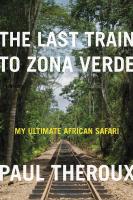 He dares refer to Angola as ‘pretty much terra incognita’ and even as a country in ‘isolation’. These descriptions are unfathomable when you consider even a basic historical listing that might take in the arrival of the Portuguese in the fifteenth century, the onward creep of Christianity, the trans-Atlantic slave trade, Portuguese colonialism, the proxy Cold War, the international oil and diamond industries, and more recently the influx of the Chinese, not to mention Angola’s major financial investments in Portugal and the explosion of kuduro music across the globe. Even at the micro level, there are plenty of Angolans who live in Luanda’s musseques, but travel across the globe to buy clothes, soft furnishings and mobile phones to sell back home. Isolated? I think not. Unknown to parochial North Americans? No doubt.
He dares refer to Angola as ‘pretty much terra incognita’ and even as a country in ‘isolation’. These descriptions are unfathomable when you consider even a basic historical listing that might take in the arrival of the Portuguese in the fifteenth century, the onward creep of Christianity, the trans-Atlantic slave trade, Portuguese colonialism, the proxy Cold War, the international oil and diamond industries, and more recently the influx of the Chinese, not to mention Angola’s major financial investments in Portugal and the explosion of kuduro music across the globe. Even at the micro level, there are plenty of Angolans who live in Luanda’s musseques, but travel across the globe to buy clothes, soft furnishings and mobile phones to sell back home. Isolated? I think not. Unknown to parochial North Americans? No doubt.
To read
12.10.2013 | by Lara Pawson
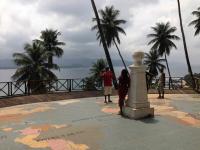 I will begin by reviewing two contrastive approaches in the anthropological and neighboring literatures on Latin America: the postcolonial and the multiple modernities perspectives. It then discusses the possible place(s) of Brazilian classic nation-building literature in these debates, putting forth an argument for the need for substantial historical embedding when addressing the postcolonial in relation to Brazil. It concludes with remarks based on ongoing ethnographic research about contemporary South-South cooperation between Brazil and the African continent.
I will begin by reviewing two contrastive approaches in the anthropological and neighboring literatures on Latin America: the postcolonial and the multiple modernities perspectives. It then discusses the possible place(s) of Brazilian classic nation-building literature in these debates, putting forth an argument for the need for substantial historical embedding when addressing the postcolonial in relation to Brazil. It concludes with remarks based on ongoing ethnographic research about contemporary South-South cooperation between Brazil and the African continent.
To read
11.10.2013 | by Letícia Cesarino
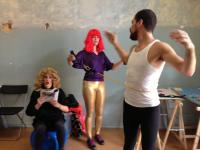 Is imperative to not look at recent events in a epiphenomenal way, focusing exclusively on the squares themselves, as if these events were “irrational”, came out of nowhere and went back to noplace (the very name “Arab Spring” seems to imply that the Spring is outside the historical time). We should instead try to understand them in continuity, alongside a myriad of encounters, practices, actions – that we call ’zones of resistance and practices of invention’.
Is imperative to not look at recent events in a epiphenomenal way, focusing exclusively on the squares themselves, as if these events were “irrational”, came out of nowhere and went back to noplace (the very name “Arab Spring” seems to imply that the Spring is outside the historical time). We should instead try to understand them in continuity, alongside a myriad of encounters, practices, actions – that we call ’zones of resistance and practices of invention’.
Games Without Borders
04.10.2013 | by Ana Bigotte Vieira
 Latin American intellectuals have been in the forefront of doing mestiçage, métissage, Anthropophagy. While we certainly consider ourselves as part of Postcolonial theory, we have also critiqued certain of its aspects, for example the ahistorical, uncritical celebration of hybridity discourse. We were asking: “What are the genealogies of such discourses?” We prefer to emphasize the question of “linked analogies” between and across national borders. So for us, cross-border analysis becomes really crucial. It is not reducible to nation-state formations.
Latin American intellectuals have been in the forefront of doing mestiçage, métissage, Anthropophagy. While we certainly consider ourselves as part of Postcolonial theory, we have also critiqued certain of its aspects, for example the ahistorical, uncritical celebration of hybridity discourse. We were asking: “What are the genealogies of such discourses?” We prefer to emphasize the question of “linked analogies” between and across national borders. So for us, cross-border analysis becomes really crucial. It is not reducible to nation-state formations.
To read
01.10.2013 | by Emanuelle Santos and Patricia Schor
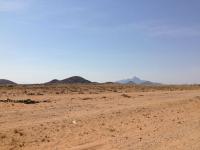 Carvalho urges to engage with and to give voice to narratives silenced or ignored by dominant ones, which also don’t allow them to have a place in mainstream historiography. Thus he makes the call to listen to the other, to other worldviews, to emerging voices. In his view, it is time to attend to all sorts of voices that the world still holds, some of which are at risk of disappearance – in everybody´s interest of human diversity.
Carvalho urges to engage with and to give voice to narratives silenced or ignored by dominant ones, which also don’t allow them to have a place in mainstream historiography. Thus he makes the call to listen to the other, to other worldviews, to emerging voices. In his view, it is time to attend to all sorts of voices that the world still holds, some of which are at risk of disappearance – in everybody´s interest of human diversity.
Ruy Duarte de Carvalho
11.09.2013 | by Marta Lança
 Researching the relations between ongoing artistic, social and political forms of life, Generative Indirections intends to explore the potentialities of performance studies in the critical space between the Social Sciences, Humanities and Art, and give voice to counter hegemonic epistemologies, blurring theory and practice. In-direction thus becomes a magnetic field, moving between theory and practice, challenging disciplinary boundaries in order to question how Performance Studies can be received in Portugal.
Researching the relations between ongoing artistic, social and political forms of life, Generative Indirections intends to explore the potentialities of performance studies in the critical space between the Social Sciences, Humanities and Art, and give voice to counter hegemonic epistemologies, blurring theory and practice. In-direction thus becomes a magnetic field, moving between theory and practice, challenging disciplinary boundaries in order to question how Performance Studies can be received in Portugal.
I'll visit
01.09.2013 | by Baldio
 ECAScreening5: The battle mentioned in the title of the movie is that between Good and Evil, symbolizing music and silence, Africa and Europe, told through the story of a Guinean musician who, caught in the convulsions of the colonial war, left for Portugal and returns home to the wedding of his daughter with a musician, ending up disturbing the ancestral equilibrium of mandinga mysticism.
ECAScreening5: The battle mentioned in the title of the movie is that between Good and Evil, symbolizing music and silence, Africa and Europe, told through the story of a Guinean musician who, caught in the convulsions of the colonial war, left for Portugal and returns home to the wedding of his daughter with a musician, ending up disturbing the ancestral equilibrium of mandinga mysticism.
Afroscreen
26.06.2013 | by Jorge Mourinha
![The Awakening of African Cinema [1962] The Awakening of African Cinema [1962]](https://www.buala.org/sites/default/files/imagecache/thumb/2013/06/rouch-jean-01-g.jpg) ECAScreening9: Today a new African cinema is coming into being, which is adding something new and significant to the cultural and artistic life of this continent. The importance of this development was underlined at an international round-table discussion held last year in Venice on “Africa and Contemporary Civilization”. At this gathering Unesco presented several studies on the cinema in Africa. The article below is an edited and abridged version of a study by Jean Rouch, in which the French film producer traces the development of the cinema in Africa and looks at some of its new trends. The subject will also be dealt in future issues.
ECAScreening9: Today a new African cinema is coming into being, which is adding something new and significant to the cultural and artistic life of this continent. The importance of this development was underlined at an international round-table discussion held last year in Venice on “Africa and Contemporary Civilization”. At this gathering Unesco presented several studies on the cinema in Africa. The article below is an edited and abridged version of a study by Jean Rouch, in which the French film producer traces the development of the cinema in Africa and looks at some of its new trends. The subject will also be dealt in future issues.
Afroscreen
26.06.2013 | by Jean Rouch
 ECAScreening8: Representations of Africa tend to reproduce old stereotypes, adapted to recent trends but ultimately reproducing, even in postcolonial times, a largely negative and monolithic image of a diverse continent. The same can be said of cinema. A more or less consensual approach to "African cinema" associates it with exoticism, making it into a genre easily recognized by Western audiences. It is this idea of a backward, monolithic Africa that the curators of African Screens, Manthia Diawara and Lydie Diakhatí, intended to challenge.
ECAScreening8: Representations of Africa tend to reproduce old stereotypes, adapted to recent trends but ultimately reproducing, even in postcolonial times, a largely negative and monolithic image of a diverse continent. The same can be said of cinema. A more or less consensual approach to "African cinema" associates it with exoticism, making it into a genre easily recognized by Western audiences. It is this idea of a backward, monolithic Africa that the curators of African Screens, Manthia Diawara and Lydie Diakhatí, intended to challenge.
Afroscreen
25.06.2013 | by Manuela Ribeiro Sanches
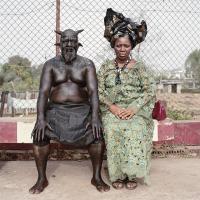 ECAScreening7: Almost from the moment of cinema’s invention, Africa has been inserted into its global system, but on the most unfavorable terms: it has been the dumping ground for second-run “B” movies from Hollywood, Bollywood and Hong Kong, films that are often racist and always estranged from African realities and purposes, while the formidable technical, infrastructural, and capital requirements of making and distributing films made it nearly impossible for Africans to respond in kind with their own films. Because of these steep infrastructural and capital requirements, cinema everywhere depends on state support, and postcolonial African states have proved indifferent, timorous, corrupt, and inept at providing it; the postcolonial African elite has been as philistine as Fanon predicted, without the power or interest to invest in culture (Fanon).
ECAScreening7: Almost from the moment of cinema’s invention, Africa has been inserted into its global system, but on the most unfavorable terms: it has been the dumping ground for second-run “B” movies from Hollywood, Bollywood and Hong Kong, films that are often racist and always estranged from African realities and purposes, while the formidable technical, infrastructural, and capital requirements of making and distributing films made it nearly impossible for Africans to respond in kind with their own films. Because of these steep infrastructural and capital requirements, cinema everywhere depends on state support, and postcolonial African states have proved indifferent, timorous, corrupt, and inept at providing it; the postcolonial African elite has been as philistine as Fanon predicted, without the power or interest to invest in culture (Fanon).
Afroscreen
25.06.2013 | by Jonathan HAYNES
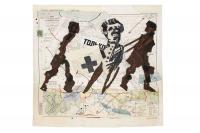 In this 2nd call we announce both topics together – BODY: IMAGES AND GEOGRAPHIES – by the inherent articulation between body, representations and space, which are not separate forms nor constitute an organically organized ecosystem. They build up each other correlatively. Thus, space is not present as mere neutral recipient of physical action and experience, it is first likely to influence and transform the body, simultaneously generating new representations. We witness a (more or less active) constant negotiation between body, representations and space.
In this 2nd call we announce both topics together – BODY: IMAGES AND GEOGRAPHIES – by the inherent articulation between body, representations and space, which are not separate forms nor constitute an organically organized ecosystem. They build up each other correlatively. Thus, space is not present as mere neutral recipient of physical action and experience, it is first likely to influence and transform the body, simultaneously generating new representations. We witness a (more or less active) constant negotiation between body, representations and space.
Body
19.06.2013 | by Buala
 ECAScreening6: A pair of Portuguese-language films quietly examine the standoff between old Europe and modern multiculturalism. Tabu was "Paradise Lost"; set in a forlorn, present-day Lisbon in which a middle-aged Christian, Pilar, takes a neighbourly interest in the affairs of Aurora, an elderly gambling addict who indulges in mild racism towards her Cape Verdean housekeeper, Santa. When Aurora dies, and Pilar tracks down the woman's former lover, the film's buttoned-up realism blossoms into "Paradise", a stylised account of the couple's days in Portuguese Africa. The affair is conducted against a stylised backdrop that is like a cinematic stampede of past-colonial fantasies and attitudes, from FW Murnau to Tarzan escapades, to the quirk-filtered nostalgia of Wes Anderson.
ECAScreening6: A pair of Portuguese-language films quietly examine the standoff between old Europe and modern multiculturalism. Tabu was "Paradise Lost"; set in a forlorn, present-day Lisbon in which a middle-aged Christian, Pilar, takes a neighbourly interest in the affairs of Aurora, an elderly gambling addict who indulges in mild racism towards her Cape Verdean housekeeper, Santa. When Aurora dies, and Pilar tracks down the woman's former lover, the film's buttoned-up realism blossoms into "Paradise", a stylised account of the couple's days in Portuguese Africa. The affair is conducted against a stylised backdrop that is like a cinematic stampede of past-colonial fantasies and attitudes, from FW Murnau to Tarzan escapades, to the quirk-filtered nostalgia of Wes Anderson.
Afroscreen
16.06.2013 | by Phil Hoad
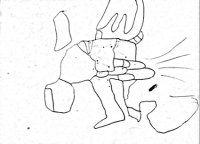 I read with attention the news of the arrival of more and more emigrants to the "shores of Europe" (which should their Europe be? In which window would they have drawn it in backlight?); I realize their presence in this Europe I live in, I feel the law enforcement and the construction of detention camps to accommodate them, society changing with their presence, my presence changing with their presence, Lisbon becoming a European capital, me becoming a Europe I don't want to be.
I read with attention the news of the arrival of more and more emigrants to the "shores of Europe" (which should their Europe be? In which window would they have drawn it in backlight?); I realize their presence in this Europe I live in, I feel the law enforcement and the construction of detention camps to accommodate them, society changing with their presence, my presence changing with their presence, Lisbon becoming a European capital, me becoming a Europe I don't want to be.
To read
26.05.2013 | by Ana Bigotte Vieira
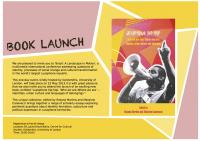 “This fascinating book looks at hip hop in the Lusophone world. Its authors explore the various aspects of hip hop culture - break dance, graffiti, rap music, and social movements based on this street culture. They scrutinise local cases and examine the multiple links between hip hop on both sides of the Atlantic, such as the new global codes that have developed among Portuguese-speaking young people.”
“This fascinating book looks at hip hop in the Lusophone world. Its authors explore the various aspects of hip hop culture - break dance, graffiti, rap music, and social movements based on this street culture. They scrutinise local cases and examine the multiple links between hip hop on both sides of the Atlantic, such as the new global codes that have developed among Portuguese-speaking young people.”
Stages
02.05.2013 | by Rosana Martins
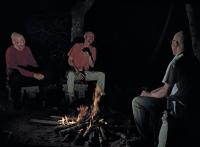 We asked an albino guy if he could tell any jokes about the Portuguese, he laughed and said, a Portuguese man arrived here in Maputo, couldn’t believe his eyes, and asked a smart and friendly looking native what they called motherfuckers in Mozambique. But sir, we don’t call them, they come from Lisbon of their own accord. And there we were, two motherfuckers in Maputo, 38 years after independence and 20 years after the civil war, the old drunk woman shouting, her eyes irradiating blood and misery, give me a mulatto, give me a mulatto or money, motherfucker.
We asked an albino guy if he could tell any jokes about the Portuguese, he laughed and said, a Portuguese man arrived here in Maputo, couldn’t believe his eyes, and asked a smart and friendly looking native what they called motherfuckers in Mozambique. But sir, we don’t call them, they come from Lisbon of their own accord. And there we were, two motherfuckers in Maputo, 38 years after independence and 20 years after the civil war, the old drunk woman shouting, her eyes irradiating blood and misery, give me a mulatto, give me a mulatto or money, motherfucker.
To read
24.04.2013 | by João Maria Gusmao + Pedro Paiva